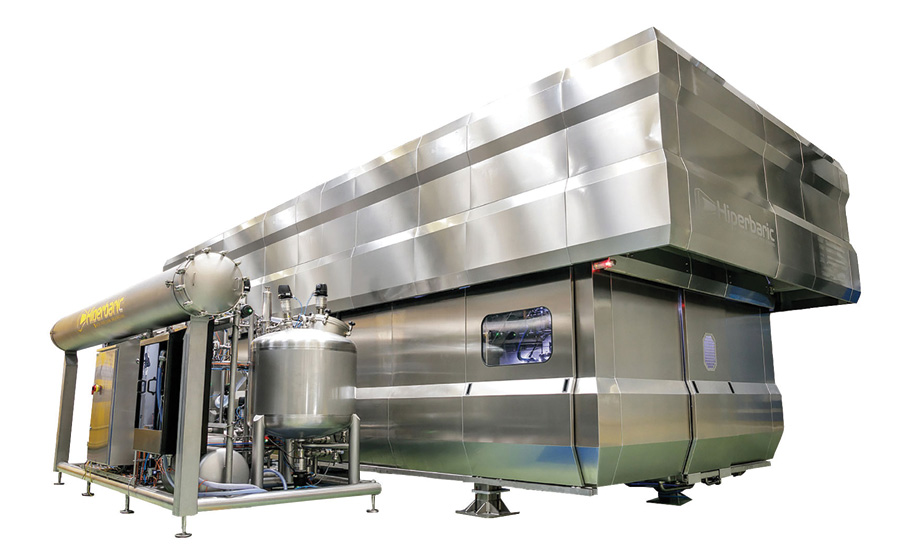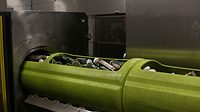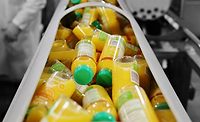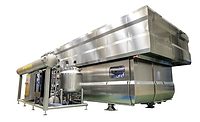High pressure processing bulk technology opens up opportunities for juice-makers
HPP’s food safety, quality preservations helps support growing plant-based juice market

High-pressure processing (HPP) continues to gain popularity in beverages. With the growing consumer demand for fresh, cold-pressed juices with fewer preservatives, HPP is fast becoming the preferred method of choice for juice producers.
HPP inactivates foodborne bacteria such as E. coli, listeria and salmonella. In addition to food safety, it has many benefits, including extending shelf life and keeping flavor and nutrients intact. In juices, HPP enables the production of high-quality, premium and ultra-premium products with the taste of freshly squeezed juice.
One of the main advantages of HPP is that it enables the development of natural, organic, preservative-free and functional products. As a non-thermal and post-packaging method, it allows the development of healthier foods that are rich in vitamins and antioxidants.
Bulk technology latest HPP advancement
HPP machine technology has advanced during the years, mainly in the manufacture of larger machines and adding equipment to allow for increased throughput. HPP machines are not one-size-fits-all options and can be customized to fit a producer’s specific requirements. One of the newest innovations in HPP is bulk technology.
Only performed by Hiperbaric at this time (patent pending), bulk technology is a global innovation for the larger production of HPP beverages. Beverages are processed in bulk before bottling, unlike classic in-pack HPP, which involves processing foods and beverages in their final packaging. With bulk technology, the HPP process is less costly due to reduced labor, production, maintenance and energy costs.
Bulk technology fits into any large beverage production line and enables the use of any type of packaging after HPP, no matter the material, design or size, which particularly can be attractive to manufacturers seeking alternatives to plastic and more environmentally friendly packaging.
Plant-based juices are latest trend
Although bulk technology is an emerging technology sure to take hold for certain customers, in-pack HPP still remains the most popular way for juice companies looking to HPP their juices. And plant-based juices are emerging as the latest products to make use of HPP.
For celery enthusiasts, Suja’s organic cold-pressed celery juice contains “straight-up” celery with a “touch” of lemon juice, according to its website. The juice is USDA certified organic, non-GMO, vegan and dairy free, with no added sweeteners, the company says.
Starbucks’ Evolution Fresh recently launched Organic Celery Glow, a “convenient celery juice without the fuss of juicing at home,” according to the company.
The company describes the juice as a “delicious, functional, ready-to-drink beverage that offers an easy way to get more nutrients from green vegetables as part of your daily diet.”
According to Starbucks, consumer interest in plant-based juices are on the rise, with the $54 million category growing in 2018.
Other fresh, homemade-tasting juices entering the U.S. market include Sofresco. The Portuguese juice company, popular in Europe under the brand Sonatural, recently launched its U.S. production facility at Universal Pure’s Malverne, Pa., location. The company sources fruits and vegetables from local farmers and cooperatives for its juices made with fresh ingredients.
Sofresco’s Douglas Gilman said the company chose HPP because “it’s the only process that allows companies to produce homemade-type juices without using heat.” Although heat destroys bacteria, it doesn’t keep the fresh fruit qualities intact.
Whether in pack or bulk technology, HPP continues to enable beverage companies to produce new cold-pressed juices that are safe and healthy for consumers — and the trend shows no sign of slowing down. As more companies learn the benefits of HPP, they increasingly will turn to this method for post-production. And that’s something to get juiced about. BI
Looking for a reprint of this article?
From high-res PDFs to custom plaques, order your copy today!







